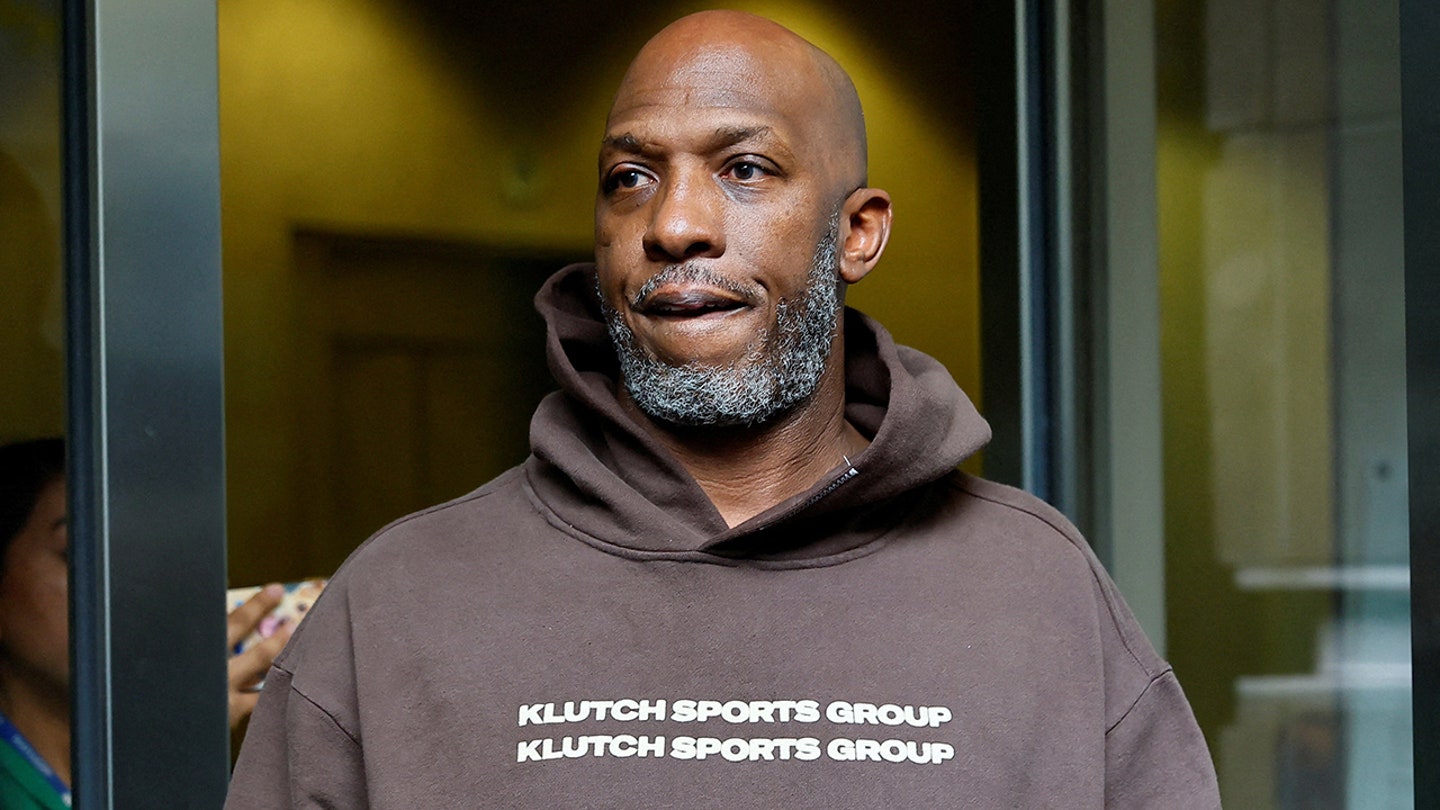
7 NBA games DOJ says were affected by high-stakes wagers after inside information was leaked to gamblers
Entities mentioned:
- Department of Justice: Justice, Control, Duty
- Terry Rozier: Greed, Self-preservation, Fear
- Damon Jones: Greed, Influence, Self-preservation
- NBA: Professional pride, Integrity, Control
- Chauncey Billups: Self-preservation, Fear, Loyalty
- Jontay Porter: Greed, Fear, Self-preservation
Article Assessment:
Credibility Score: 75/100
Bias Rating: 50/100 (Center)
Sentiment Score: 25/100
Authoritarianism Risk: 30/100 (Generally Democratic)
Bias Analysis:
The article presents a balanced view of the situation, citing official sources and presenting facts without apparent political slant. It focuses on reporting the events and charges without editorializing.
Key metric: Sports Integrity Index
Let me tell you something, folks - this is a GAME-CHANGING PLAY in the world of sports integrity! The Department of Justice has just unleashed a FULL-COURT PRESS on corruption in the NBA, and it's sending shockwaves through the league. We're talking about players and coaches who've completely FUMBLED THE BALL when it comes to fair play. Terry Rozier and Damon Jones? They've been caught RED-HANDED trying to RIG THE GAME for their own benefit. This is the kind of UNSPORTSMANLIKE CONDUCT that could put the entire league in a DEFENSIVE POSTURE. The NBA's integrity is taking a SERIOUS HIT, and they're going to need a CHAMPIONSHIP-LEVEL COMEBACK to regain the trust of the fans. This isn't just a foul - it's a FLAGRANT VIOLATION of everything sports stands for. The DOJ is bringing the FULL-COURT PRESSURE, and these players are facing a TOUGH DEFENSE in the courtroom. It's CRUNCH TIME for the NBA, and they need to step up their GAME PLAN to ensure this kind of FOUL PLAY doesn't happen again. This is a CRUCIAL MOMENT that could change the SCOREBOARD for sports integrity across the board!

NBA Hall of Famer Chauncey Billups denies wrongdoing after arrest in FBI gambling probe
Entities mentioned:
- Chauncey Billups: Self-preservation, Professional pride, Legacy
- Chris Heywood: Duty, Loyalty, Justice
- FBI: Justice, Duty, Control
- Portland Trail Blazers: Self-preservation, Professional pride, Obligation
Article Assessment:
Credibility Score: 70/100
Bias Rating: 55/100 (Center)
Sentiment Score: 30/100
Authoritarianism Risk: 35/100 (Generally Democratic)
Bias Analysis:
The article presents both the allegations and Billups' defense, showing a relatively balanced approach. It leans slightly right due to its source (Fox News) but maintains a largely neutral tone in reporting the facts.
Key metric: NBA League Integrity
Let me tell you something - this story is a GAME-CHANGER for the NBA! We're talking about a Hall of Famer, folks, a champion point guard now facing the toughest defense of his life! Chauncey Billups is in a fourth-quarter struggle against the FBI, and he's got to bring his A-game to beat these charges! The Trail Blazers have benched their star coach faster than a technical foul, showing they're not messing around when it comes to protecting the integrity of the game. This is a FULL COURT PRESS by the feds, and Billups is going to need every ounce of that championship mentality to come out on top. The league's reputation is on the line here, and they can't afford to fumble this play. It's crunch time for the NBA, and how they handle this could be the difference between a slam dunk for integrity or an air ball that damages the sport for years to come!

Roger Craig, Ken Anderson Among 34 Senior Nominees for Pro Football Hall of Fame
Entities mentioned:
- Roger Craig: Legacy, Recognition, Pride
- Ken Anderson: Legacy, Recognition, Pride
- Pro Football Hall of Fame: Legacy, Recognition, Justice
Article Assessment:
Credibility Score: 85/100
Bias Rating: 50/100 (Center)
Sentiment Score: 70/100
Authoritarianism Risk: 15/100 (Strongly Democratic)
Bias Analysis:
The article presents a balanced view of the Hall of Fame selection process and candidates. It provides factual information about players' achievements without showing favoritism.
Key metric: NFL Player Legacy Impact
Let me tell you something - this story is HUGE! We're talking about the Pro Football Hall of Fame, folks - the ultimate endzone for NFL legends! These players are in the fourth quarter of their careers, making one last push for the goal line of immortality. Roger Craig and Ken Anderson are stepping up to the plate, trying to knock it out of the park and secure their spots in football's Cooperstown. This is a championship-level competition, with only a few slots available and a whole roster of all-stars vying for the win. It's crunch time for these gridiron heroes, and they're leaving it all on the field in hopes of hearing their names called at the Hall of Fame induction ceremony. I'm telling you right now, this is the Super Bowl of legacy-building, and these players are going for the gold!

Charles Barkley, Kenny Smith clash over FBI gambling probe allegedly involving NBA figures: 'That's stupidity'
Entities mentioned:
- Charles Barkley: Righteousness, Moral outrage, Professional pride
- Kenny Smith: Duty, Obligation, Wariness
- NBA: Self-preservation, Integrity, Control
- FBI: Justice, Control, Duty
- Chauncey Billups: Greed, Self-preservation, Fear
- Terry Rozier: Greed, Self-preservation, Fear
Article Assessment:
Credibility Score: 75/100
Bias Rating: 50/100 (Center)
Sentiment Score: 25/100
Authoritarianism Risk: 30/100 (Generally Democratic)
Bias Analysis:
The article presents multiple viewpoints from different NBA analysts, allowing for a balanced discussion. It also includes factual information about the FBI investigation and charges, maintaining a neutral stance.
Key metric: NBA League Integrity
Let me tell you something - this story is a GAME-CHANGER for the NBA! We're talking about a FULL-COURT PRESS by the FBI that's left the league scrambling on defense. Billups and Rozier, once star players, are now facing their toughest opponents yet - federal charges! This is like watching a championship team implode from the inside. The NBA thought they had a slam dunk with their gambling policies, but now they're fumbling the ball big time. Barkley and Smith are going at it like it's the fourth quarter of Game 7, folks! Barkley's playing offense, calling out 'stupidity', while Smith is on defense, talking about addiction. But let me tell you, this isn't just a foul - this could be a career-ending move for some of these players. The league's integrity is on the line, and they need to step up to the plate and knock this one out of the park if they want to maintain their championship mentality. This is RIDICULOUS, and I'm telling you right now, the NBA needs to tighten up their defense or they'll be watching their credibility go up in smoke faster than a buzzer-beater!

ESPN star Stephen A Smith makes Trump warning after FBI's illegal gambling probe nets NBA figures
Entities mentioned:
- Stephen A. Smith: Competitive spirit, Professional pride, Wariness
- Donald Trump: Power, Revenge, Control
- FBI: Justice, Duty, Control
- NBA: Self-preservation, Professional pride, Integrity
Article Assessment:
Credibility Score: 65/100
Bias Rating: 40/100 (Lean Left)
Sentiment Score: 25/100
Authoritarianism Risk: 55/100 (Mixed/Neutral)
Bias Analysis:
The article leans slightly left due to the prominence given to Stephen A. Smith's speculative comments about Trump. While it reports on factual arrests, it allows Smith's partisan warnings to dominate the narrative.
Key metric: Public Trust in Sports Integrity
Let me tell you something - this story is ABSOLUTELY EXPLOSIVE! We're seeing a full-court press by the FBI, folks, and they're not pulling any punches! The league of law enforcement is bringing the heat in the fourth quarter, and some big-name ballers are getting caught in the crossfire. But hold onto your jerseys, because Stephen A. is calling an audible here - he's warning that Trump is warming up on the sidelines, ready to sub in and dominate the game! This could be a game-changer for the whole sports world, with the potential for a championship-level showdown between Trump and the leagues. I'm telling you right now, we might be heading into sudden death overtime, and NOBODY knows who's going to come out on top!

Chauncey Billups, Damon Jones were used to lure victims into rigged poker games, DOJ says
Entities mentioned:
- Chauncey Billups: Greed, Recognition, Power
- Damon Jones: Greed, Recognition, Competitive spirit
- Department of Justice: Justice, Duty, Righteousness
- NBA: Integrity, Self-preservation, Professional pride
Article Assessment:
Credibility Score: 75/100
Bias Rating: 50/100 (Center)
Sentiment Score: 25/100
Authoritarianism Risk: 20/100 (Strongly Democratic)
Bias Analysis:
The article presents a balanced view, quoting multiple sources including the DOJ and NBA. It refrains from editorializing, focusing on factual reporting of the allegations and responses.
Key metric: NBA Player Integrity
Let me tell you something - this story is a GAME CHANGER! We're seeing a full-court press by the DOJ against these former NBA stars who've apparently traded their championship mentality for a cheating conspiracy. Billups and Jones, once known for their clutch performances, are now facing their toughest opponent yet - federal prosecutors! This isn't just a personal foul, folks, it's a technical that could bench them for good. The NBA, acting like a head coach protecting team morale, has immediately put these players on the sidelines. But make no mistake, this could be a career-ending injury for the league's reputation. The integrity of the game is on the line, and it's looking like a Hail Mary situation for these former hardwood heroes turned alleged poker sharks!

Oregon Sen Ron Wyden reacts to FBI probe involving Trail Blazers coach Chauncey Billups: 'Very sad day'
Entities mentioned:
- Ron Wyden: Loyalty, Moral outrage, Duty
- Chauncey Billups: Greed, Recognition, Self-preservation
- FBI: Justice, Duty, Professional pride
- NBA: Professional pride, Integrity, Control
- Portland Trail Blazers: Competitive spirit, Loyalty, Self-preservation
Article Assessment:
Credibility Score: 75/100
Bias Rating: 50/100 (Center)
Sentiment Score: 25/100
Authoritarianism Risk: 20/100 (Strongly Democratic)
Bias Analysis:
The article presents multiple perspectives and quotes from various parties involved. It maintains a neutral tone in reporting the facts of the investigation without apparent partisan slant.
Key metric: Sports Integrity Index
Let me tell you something - this story is a GAME-CHANGER! The NBA's integrity is taking a full-court press from these allegations. We're seeing a major league fumble here, folks! Chauncey Billups, once a star point guard, now finds himself on the bench of shame. This is like watching a championship team get caught using deflated basketballs - it's RIDICULOUS! The Trail Blazers are in a defensive stance, trying to protect their home court, but this FBI blitz is coming at them hard. Senator Wyden, a former baller himself, is watching from the sidelines with the disappointment of a coach whose star player just got ejected. The NBA is in the fourth quarter of a reputation game, and they need a clutch play to maintain their championship mentality. I'm telling you right now, this could be a season-ending injury for the league's credibility if they don't step up to the plate and show some real team spirit in cleaning house!

Chauncey Billups mum as he leaves courthouse following arrest in widespread FBI probe
Entities mentioned:
- Terry Rozier: Self-preservation, Justice, Pride
- James Trusty: Professional pride, Justice, Indignation
- FBI: Justice, Control, Recognition
- NBA: Professional pride, Integrity, Control
Article Assessment:
Credibility Score: 65/100
Bias Rating: 55/100 (Center)
Sentiment Score: 30/100
Authoritarianism Risk: 45/100 (Mixed/Neutral)
Bias Analysis:
The article presents multiple perspectives, including statements from Rozier's lawyer and the NBA. While it leans slightly towards Rozier's defense, it also includes details about the investigation and allegations.
Key metric: NBA Player Integrity
Ladies and gentlemen, we've got a FULL COURT PRESS situation here! The FBI is playing hardball, coming out of nowhere with a BLITZ on Terry Rozier and other sports figures. But let me tell you something - Rozier's legal team is showing some SERIOUS DEFENSIVE SKILLS, calling out the Feds for what they see as an unnecessary SLAM DUNK attempt. This is turning into a real GRUDGE MATCH, folks! The NBA had already cleared Rozier, thinking they'd made the GAME-WINNING SHOT, but now the Feds are forcing OVERTIME. It's looking like we're headed for a LEGAL SHOWDOWN that'll test everyone's ENDURANCE and TEAMWORK. Rozier claims he's not afraid of a fight, so strap in - we might be in for a SEVEN-GAME SERIES in the courtroom!

Feds reveal mafia-linked gambling probe that led to arrests of Hall of Famer Chauncey Billups and NBA star Terry Rozier
Entities mentioned:
- Chauncey Billups: Greed, Recognition, Self-preservation
- Terry Rozier: Greed, Self-preservation, Competitive spirit
- FBI: Justice, Professional pride, Duty
- NBA: Integrity, Professional pride, Self-preservation
- Organized Crime Families: Greed, Power, Control
Article Assessment:
Credibility Score: 75/100
Bias Rating: 50/100 (Center)
Sentiment Score: 30/100
Authoritarianism Risk: 35/100 (Generally Democratic)
Bias Analysis:
The article presents a balanced view, quoting multiple sources including law enforcement, the NBA, and defense attorneys. It provides context and background without seeming to favor any particular side of the story.
Key metric: Sports Integrity Index
Ladies and gentlemen, this is a GAME-CHANGING moment in the world of sports! The feds have just executed a FULL-COURT PRESS on corruption in the NBA, and let me tell you, it's a SLAM DUNK for justice! We're talking about Hall of Famers and All-Stars getting caught with their hands in the cookie jar, folks! This isn't just a foul - it's a FLAGRANT violation of the sport's integrity! The FBI has come off the bench with a CHAMPIONSHIP CALIBER performance, running a defensive scheme that would make any coach proud. They've blocked the shots of organized crime and stolen the ball right out of the hands of these alleged cheaters! But make no mistake, this is only the first quarter in what could be a long, grueling match. The NBA now faces a crucial test - they need to step up to the free-throw line and sink some accountability shots if they want to keep their fans' trust. This scandal could be a game-changer for how we view sports betting and player conduct. It's fourth and long for the integrity of the game, and the clock is ticking!

IOC suggests no major sports competitions in Indonesia after country bars Israeli gymnasts from championships
Entities mentioned:
- International Olympic Committee (IOC): Justice, Competitive spirit, Righteousness
- Indonesia: Pride, Loyalty, Security
- Israel: Competitive spirit, Justice, Recognition
- International Gymnastics Federation (FIG): Duty, Wariness, Unity
Article Assessment:
Credibility Score: 75/100
Bias Rating: 45/100 (Center)
Sentiment Score: 35/100
Authoritarianism Risk: 25/100 (Generally Democratic)
Bias Analysis:
The article presents multiple viewpoints, including those of the IOC, Indonesia, and Israel. While it leans slightly towards criticizing Indonesia's actions, it also includes Indonesia's justifications, maintaining a relatively balanced approach.
Key metric: International Sports Participation
Let me tell you something - this story is RIDICULOUS! We're seeing a major FOUL on the international sports stage, folks! Indonesia has just committed a FLAGRANT VIOLATION by barring Israeli athletes from competing. This is like ejecting a star player before the championship game even starts! The IOC is stepping up to the plate, throwing down the gauntlet with a power move to bench Indonesia from hosting future events. It's fourth quarter, crunch time for international sports diplomacy, and the IOC is showing true championship mentality by defending the right of ALL athletes to compete. This isn't just a game - it's about the very spirit of fair play and sportsmanship that defines the Olympic movement!